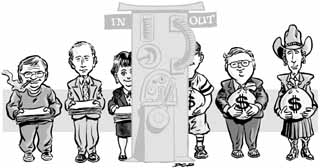Austin @ Large: Austin at Large: No Free Lunch
Where campaign finance is concerned, Austin gets what it pays for
By Mike Clark-Madison, Fri., Dec. 14, 2001

If the question is "How do we fix Austin politics?" your answer probably won't be, "Pay Leslie and Jennifer Gale to run for office!" Surely, you wouldn't want to go there.
When discussing the proposed Austin Fair Elections Act, however, too many people have gone there. The Austin American-Statesman, for example, blithely editorialized in August that the citizen-initiative public financing plan sponsored by Campaigns for People, which will go before the voters in May, would cost citizens $50,000 per council candidate, and that nothing required the recipients to spend the money on campaigning. (Leslie needs a new pair of shoes!) This oversimplifies what is admittedly a complex proposal; these are, after all, matching funds, and despite their mediagenic ways, Leslie, Gale, et al. aren't known for their fundraising prowess. Yet the daily's math is more or less accurate. Proponents estimate that in 2006 -- when the system would be fully up and running -- a Fair Elections Act could cost as much as $1.3 million for both general elections and runoffs for the mayor and three council members.
Since 1985, we've averaged five candidates per council race. That makes the 2006 estimate closer to $60,000 per candidate, though only candidates who agree to the Act's spending limits will actually get funds. (The mayoral hopefuls could get more, and those in runoffs could get funds twice.) That's real money, though $1.3 million is about what was spent in the 1997 mayor's race alone. And unlike the matching-funds system used in federal elections, only a fraction of the funds called for in the Fair Elections Act would be offset by incoming revenue.
Currently, Austin's public financing is very limited. Candidates who agree to its spending limits -- many don't -- and who make it to the runoff can split the kitty in the city's lobbyist-fee fund. Raul Alvarez and Rafael Quintanilla each got nearly $30,000 in public financing this way in 2000. (This was about one-quarter of what Alvarez, the winner, spent in total.) The Fair Elections Act system, which would replace this, is not tied to the amount of cash on hand, and that's not pleasing to city administrators and their little shadows at the daily.
But the Statesman is not of one mind. Columnist Susan Smith had, a month earlier, offered qualified support, writing that "If the Austin Fair Elections Act isn't the right proposal, then let's see the alternative." Good point. We already know that another free-lunch reform measure will not do. (Of course, this all assumes we don't have single-member districts; if we did, then this discussion might only apply to the mayor's race, since it would require very little money to run for a council seat.) A free lunch is what the last citizen campaign-finance initiative -- sponsored by Austinites for a Little Less Corruption and adopted in August 1998 -- promised to a city that proponents felt was hungry for reform. In a sane world, we could reduce the importance of money in politics by not letting one candidate outspend another. But in 1975, the U.S. Supreme Court ruled this option a no-can-do.
So, the ALLC measure put campaigns on a wholesome diet of $100 contribution limits. Now, we've had just as many candidates run since ALLC kicked in; we just haven't had as many good ones, since in a land of funding scarcity, them that has, gets. Each ballot has been plump with ideologues and eccentrics and lean of serious challengers, and even ALLC backers agree that the measure has tilted the field toward incumbents and the personally wealthy.
But that's what we get for pretending we could take money out of politics. Politics costs money because we cost money. The pols may be taking their money from loathsome fat cats who pee on the carpet, but they're spending it on us voters and our many needs. They print flyers and signs, go to forums and debates, walk blocks, hold coffees with neighborhood leaders, wear odd articles of clothing, belt out "De Colores" off-key at Plaza Saltillo, and yes, put up a lot of advertising (another consequence of not having single-member districts). If politicians didn't have to whore themselves, regularly, to keep us informed and entertained, the amount of money wouldn't be an issue.
Spending limits would put us on a diet, not the candidates, and that doesn't pass constitutional muster. Hence public financing. The Fair Elections Act's backers feel that competitive challengers would be more likely to run if we gave them money. Duh. More important, it would improve the quality -- and even just the visibility -- of the campaigns they run. When we tool around town during the voting season, we don't hear "God, I'm so revolted by the candidates!" though they may indeed be revolting. We hear "Election? What election?" Ignorance may be bliss, but it will not make your streets safer or cleaner.
So, we have three choices: One, we can accept the status quo and congratulate ourselves that only nine out of 10 Austin voters stayed home last time. Two, we let the city spend a bunch of money trying to get people excited about voting for people they know nothing about. Or three, we give the same money to the candidates and let them do the job in a free electoral market. If public financing is unacceptable, then we will continue to get what we pay for. Nothing.
Got something to say on the subject? Send a letter to the editor.








